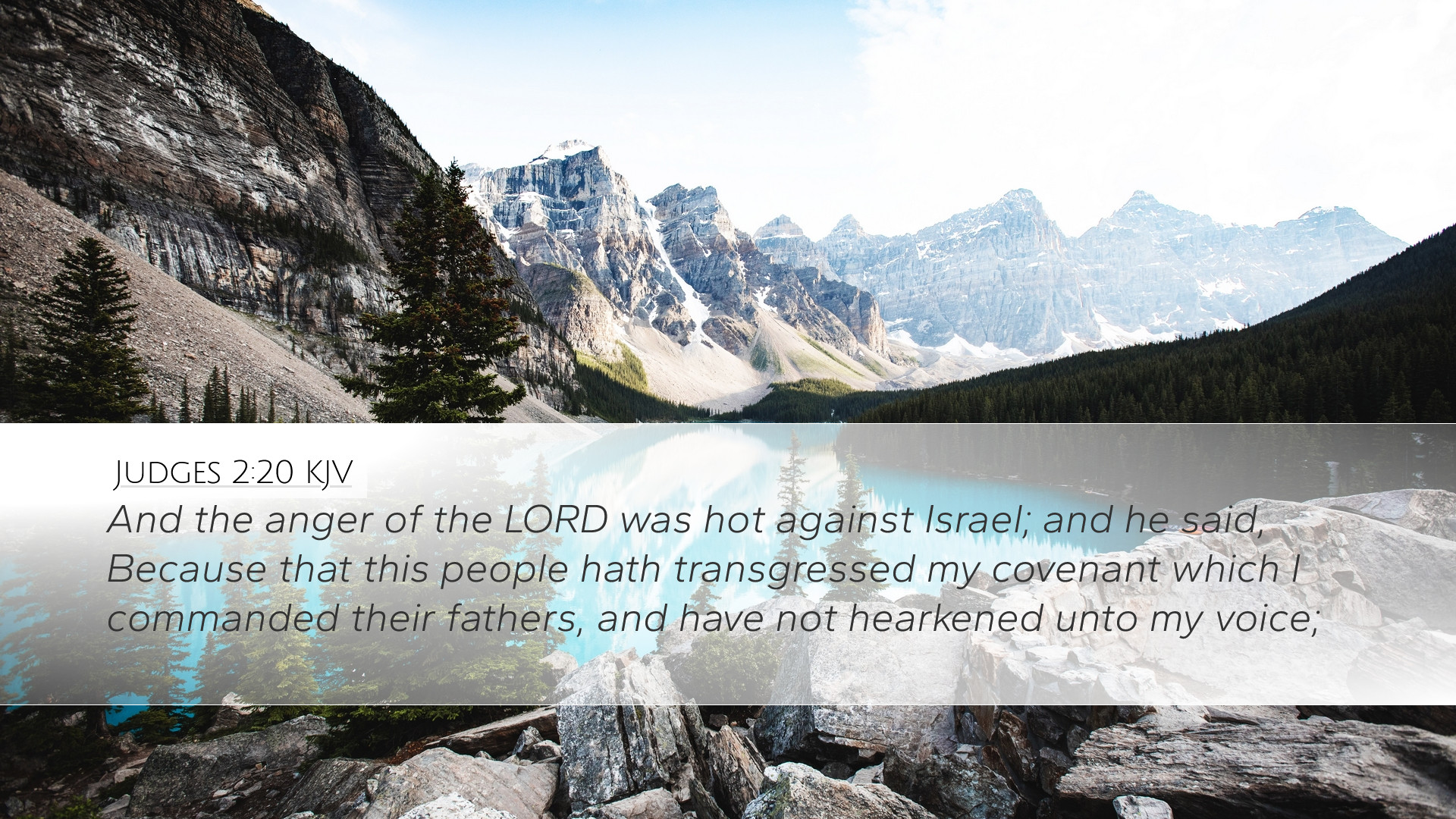Old Testament
Genesis Exodus Leviticus Numbers Deuteronomy Joshua Judges Ruth 1 Samuel 2 Samuel 1 Kings 2 Kings 1 Chronicles 2 Chronicles Ezra Nehemiah Esther Job Psalms Proverbs Ecclesiastes Song of Solomon Isaiah Jeremiah Lamentations Ezekiel Daniel Hosea Joel Amos Obadiah Jonah Micah Nahum Habakkuk Zephaniah Haggai Zechariah MalachiJudges 2:20
Judges 2:20 KJV
And the anger of the LORD was hot against Israel; and he said, Because that this people hath transgressed my covenant which I commanded their fathers, and have not hearkened unto my voice;
Judges 2:20 Bible Commentary
Bible Commentary on Judges 2:20
Judges 2:20 (KJV): "And the anger of the Lord was hot against Israel: and he said, Because that this people hath transgressed my covenant which I commanded their fathers, and have not hearkened unto my voice."
Introduction
The book of Judges presents a pivotal aspect of Israel's history, capturing the cyclical nature of obedience and rebellion among the people of Israel. Judges 2:20 serves as a sobering reminder of the consequences of disobedience to God's covenant. This commentary aims to glean insights from revered public domain commentaries, such as those by Matthew Henry, Albert Barnes, and Adam Clarke, to provide a meaningful exploration of this verse for pastors, students, theologians, and Bible scholars.
The Context of Israel's Sin
The historical backdrop of this verse is crucial for understanding its implications. The cycle of sin, oppression, repentance, and deliverance is a recurring theme in Judges. According to Matthew Henry, the disobedience mentioned here reflects a broader spiritual decay among the Israelites, as they turned away from the commands of God, which were intended to guide them into a fruitful relationship with Him.
Albert Barnes highlights that the "anger of the Lord" signifies a deep-seated displeasure that arises from disobedience and infidelity to the covenant. God’s covenant was not merely a set of rules; it served as the foundation of Israel’s identity and relationship with the Creator. Thus, the transgression of this covenant was a breach of trust and loyalty.
Divine Wrath and Its Righteousness
Adam Clarke remarks on the intensity of God's anger in this passage, indicating that it is both just and necessary. This expression of divine wrath serves as a catalyst for correction, aiming to bring the people back to the path of righteousness. Clarke illustrates the multifaceted nature of God's anger, which is rooted in His holiness and the expectation of obedience from His chosen people.
The phrase "his anger was hot" is indicative of a passionate response from God, reflecting His deep love for His covenant people. Henry notes that while God's anger is fierce, it is also an expression of His commitment to justice. This anger is not arbitrary; rather, it is tied to His enduring nature of holiness and righteousness.
Transgression of the Covenant
The specific act of transgression is critical for understanding the gravity of Israel's situation. The term "transgressed my covenant" highlights a fundamental breach that goes beyond mere disobedience. Barnes explains that this involves a deliberate act of rebellion against the commitments made to God, representing a rejection of the guidance and protection that comes from following His commands.
Such transgressions reflect a deeper spiritual malaise, wherein the Israelites' actions are disconnected from their covenant relationship with God. Clarke emphasizes that the covenant was an agreement founded on mutual fidelity, and Israel's failure to heed God's voice leads to vulnerability and spiritual decline.
The Consequences of Disobedience
The consequences of Israel's actions reveal a sobering truth about divine justice. Henry asserts that God’s anger serves a dual purpose: as a response to sin and as a means of prompting repentance. The fallout from disobedience often manifests in tangible suffering and calamity, which serves to awaken the awareness of the need for reconciliation with God.
Barnes amplifies this point, noting that such divine rebuke is intended not simply to punish but to direct the heart back toward God’s mercy. The cycle depicted in Judges points to the vital need for accountability and humility before God. It showcases the reality that rebellion against divine instruction results not only in judgment but also in alienation from the presence of God.
Call to Heed God's Voice
The last part of the verse emphasizes the imperative for Israel to "hearken unto my voice." This call to attentive obedience underscores the importance of discernment in following God's leading. Clarke reflects on how God's voice is often manifested through the law, the prophets, the wisdom of leaders, and the inner prompting of the Holy Spirit.
Henry highlights the notion that hearing and obeying God’s voice is foundational for maintaining one's covenant relationship with Him. It’s not enough to merely acknowledge God's commands; there must be a genuine commitment to living them out. Failure to listen profoundly affects the community's collective relationship with the Creator.
Theological Reflections
This verse provides pivotal theological insights that are relevant not only to the ancient Israelite community but to contemporary believers as well. It reflects on the themes of sin, consequence, repentance, and the nature of God as just and merciful. Barnes encourages believers today to reflect on their personal commitments to God, inviting them to evaluate their faithfulness in light of His covenantal promises.
The call to heed God's voice continues to resonate with believers across generations, reminding them that God’s guidance remains accessible. Henry posits that the Lord’s desire is not to punish but to restore, emphasizing that even in judgment, God’s intent is to guide His people toward repentance and renewed fellowship.
Conclusion
Judges 2:20 encapsulates the profound complexities of the divine-human relationship, underscoring the severity of transgression and the righteous anger of God in response to disobedience. By pulling together insights from esteemed public domain commentaries, this commentary highlights God's unchanging nature as a covenant keeper, His righteousness in judgment, and His longing for repentance from His people.
For pastors, students, theologians, and Bible scholars, this text calls for an introspective look at our own fidelity to God's voice and covenant. It reminds us of the enduring significance of living in obedience and the hope of restoration that lies in genuine repentance. As we navigate our faith journeys, may we consistently seek to hear and heed the voice of God, ensuring that our lives reflect a committed response to His everlasting covenant.


